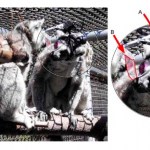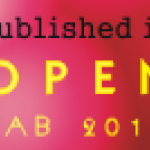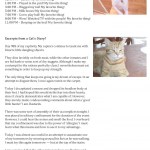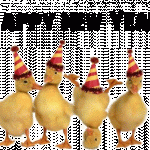
The first proper session I attended at Science Online was I-wish-my-science-teachers-had-been-like Stacy Baker's workshop on Prezi. Despite some issues with the hotel wifi, it was a fantastic session, and I learned quite a bit. Clearly, there are some things better suited to Keynote/Powerpoint, and some presentations perhaps better suited to Prezi (just as they are still some types of presentations best suited to whiteboards or chalkboards).
I think Prezi can be really effective for teaching part-whole relationships, and the zooming tool can be really useful for, for example, getting deeper…
Here are my Research Blogging Editor's Selections for this week:
Christian Jarrett of BPS Research Digest starts us off with a big cup of coffee. Coffee helps women cope with stressful meetings but has the opposite effect on men.
What's the point of music? Steven Pinker once famously remarked that music is "...auditory cheesecake, an exquisite confection crafted to tickle the sensitive spots of...our mental faculties." Henkjan Honing of the Music Matters blog asks, Was Steven Pinker right after all?
From a relatively new blog, Smells Like Science, an interesting take on chimpanzee warfare.…
I'm not sure exactly how, but somewhere between the lemurs, the books, the dinners, and the ridiculously short sleep sessions that I encountered at Science Online, I managed to learn quite a bit from many of those science writers to whose level of awesomeness I aspire, and am consequently left with a handful of scattered thoughts.
Here is the first set of those scattered thoughts. Comments are, as always, welcomed and appreciated.
At the first of two sessions that I helped co-moderate, we discussed ways for the more established science writers to help support new talent. There is a bit of a…
Just now, attendees of Science Online 2011 are getting their #scio11 Swag Bags as they register and prepare for the Keynote. And in those swag bags are postcards revealing the cover of Open Lab!
But even if you're not at Science Online, you, too, can revel in the awesomeness of the brand-spankin'-new cover.
Behold! (Click to behold even larger!)
Thanks to science illustrator extraordinaire Andrea Kuszewski (blog, twitter) for the art and design.
Behold! The second installment of the Science Online Lemur Cognition series. If you missed the first installment, you should check out the cyborg lemurs of the Duke Lemur Center.
There's some pretty good evidence that numerical cognition emerged fairly early in the primate lineage, at least, if not significantly earlier in evolution. Most of the work on numerical cognition in non-human primates, however, has focused on a handful of monkey and ape species. The prosimian suborder of primates, however, which includes lemurs, diverged from the main primate lineage some 47-54 million years ago. If…
Greetings! After emerging from the Cave of Open Lab (have you seen all the awesome posts that were chosen?), I'm back with the best in psychology and neuroscience research blogging from the past week.
Over at Games With Words, we learn that "If Microsoft Word had its way, passive verbs would be excised from the language." Learning the passive. And are three bicycles had by John?
One way that Indiana Jones and I are alike are that we both hate snakes. Could this be innate? Christian Jarrett of BPS Research Digest discusses research that suggested "children as young as three seem to be…
In honor of Science Online, which begins on Thursday night, I will be writing about lemurs this week. Why lemurs? Because on Friday morning, as a part of Science Online, I will be taking a tour of the Duke Lemur Center.
It is common among animals - especially primates - to orient their gaze preferentially towards other individuals, as well as to follow the gaze of others. Lots of attention has been paid to gaze-following, in part because the ability to recognize and orient to the behavior of others is missing or impaired in various developmental disorders, such as autism. It is well known…
It's here! After more than a month of reviewing, I am pleased to announce the list of posts that will be included in this year's edition - the fifth - of The Open Laboratory!
In no particular order:
Givin' props to hybrids by DeLene Beeland
The decade the clones came: Beware the mighty Marmokrebs! by Zen Faulkes
Can seabirds overfish a resource? The case of cormorants in Estonia by Hannah Waters
The Data Speak by Andrew Thaler
Testing the flotation dynamics and swimming abilities of giraffes by way of computational analysis by Darren Naish
Shark week! by EcoPhysioMichelle
Size really does…
If this doesn't tug on the heartstrings, at least a little bit, you may not be quite human.
As with yesterday's post, I don't know where this came from or who wrote it. If you do, please let me know so I can properly attribute it. It is again, a very "tall" image, so I've placed it behind the fold.
Click to enlarge.
I'm not sure where this is from, or who made it (if you do, though, please let me know so I can give it proper attribution). But I think its hilarious and awesome. The image is particularly large, though, so I've placed it behind the fold.
Click to enlarge:
Even though I'm on a mini-blogcation (owing to my temporary residence in the Cave of Open Lab), I'd like to take a moment to wish all of my readers and friends across the blogosphere, a very Happy New Year.
I plan on being back to a somewhat normal blogging schedule in about a week (something like January 10). Enjoy these hilarious animal videos (behind the fold), in the meantime.
Image source
Here are my Psychology/Neuroscience Research Blogging Editor's Selections for this week:
If you've just run 29 laps would you endure the pain and run a round 30 laps? If you've run 31 laps, would you attempt to eek out one extra lap to make 32? Most people would rather run 30 laps than 29, but wouldn't run the extra lap in the second case. Why not? Michelle Greene of the NeuRealism blog explains.
A timely post: does gift-wrapping influence the gift-receiver? Will he or she be more satisfied with the contents of his or her gift, if it is wrapped? At Maniraptora: Tastes Like Chicken,…
I'm still here, I swear. Most of the time I'd normally devote to writing blog posts has been spent in the Cave of Open Lab™, the last couple weeks. But it will be worth it, I promise.
Brief update, by the numbers:
900 posts (first reviews back on 266 of them; waiting on the remaining 634)
41 reviewers
1 editor (that's me)
1 series editor
1 cover designer (it's done and it looks awesome! - but, yes, we're keeping it a secret for now)
An artist's rendition of the Cave of Open Lab™ (source)
In the meantime, if you'd like some awesome stuff to read, why not read some of the posts that were…
Here are my Research Blogging Editor's Selections for this week:
Bill Yates asks, Do Personalities Converge After Marriage? Or do similar people simply wind up marrying each other in the first place?
"'Rectal stimulation', you say. Sounds all fun and games, but actually this study is an important one. It's looking at potentials traveling up from the rectum to the brain, and trying to detect them in both the spinal cord and the cortex." Let Scicurious take you on this journey.
"A study out of the journal Sex Roles took a look at preschoolers' attitudes towards obesity by means of Candy Land…
Sometimes, when trolling through your institution's journal subscriptions online, you wander into a treasure trove. I happened upon such a treasure trove recently: the Journal of Animal Behavior, which was published for just six years, between 1911 and 1916.
The studies described in this journal were being conducted at a time when experimental psychology was just emerging as a serious scientific discipline. In 1881, for example, Wilhelm Wundt organized the first scientific journal devoted to psychological science. The first laboratory for experimental psychology was established at Yale…
Here are my Research Blogging Editor's Selections for this week:
DJ Busby of the Astronasty blog writes, "2 to 3 billion people, about half the world's population, have a brain parasite called Toxoplasma gondii, which causes a disease called toxoplasmosis...The parasite's main host are cats, but infects many warm blooded animals." I always knew cats were evil. Half the world's population is infected by cats!
A new (to me) blog has recently come to my attention: Notes on Parenting. In this post, Brandon writes, "As parents, we are almost constantly comparing our child to someone else's child…
King of all blogmemery Drugmonkey has started another one this week.
The rules for this blog meme are quite simple. Post the link and first sentence from the first blog entry for each month of the past year.
Seems easy enough. Instead of just choosing the first blog entry this month, however, I'm going rogue and just randomly choosing a blog entry from each month. I've been blogging The Thoughtful Animal for exactly a year, so I'll have something for each month (my one-year bloggiversary will be during Science Online).
Without further ado:
January: As promised, here is the beginning of a…
I've got an article that appeared in this week's Jewish Journal of Greater Los Angeles about recent research from Hadassah University on the neurobiology of bilingual (English-Hebrew) reading.
Is the English-reading brain somehow different from the Hebrew-reading brain? You might not expect any major differences; after all, both languages are alphabetic and are read more or less phonetically by breaking words into their constituent sounds. Compare English and Hebrew to a logographic language like Chinese or Japanese, and the similarity between the alphabetic languages becomes obvious. But…
Eric M. Johnson and I spent about 45 minutes discussing "evolutionary psychology beyond sex" last night, which you can see today on Bloggingheads "Science Saturday."
Or just watch it here:











